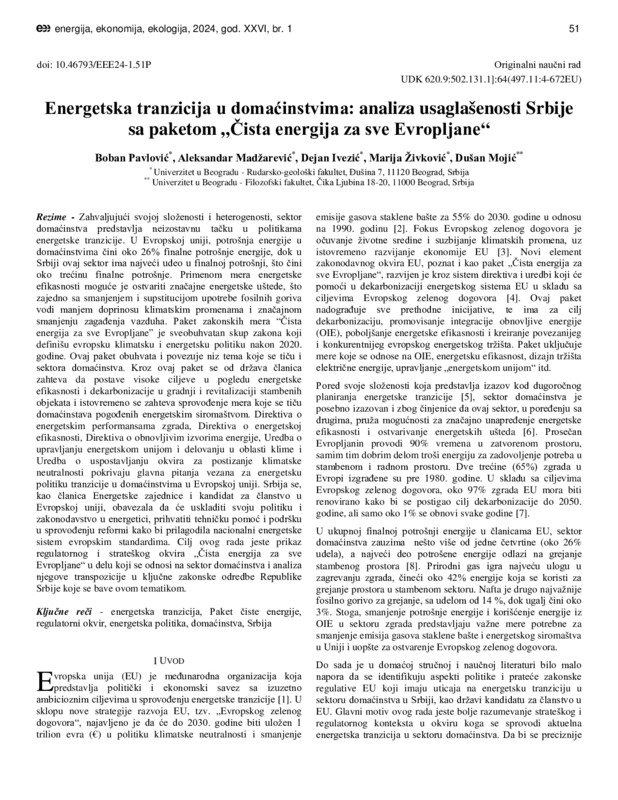Energetska tranzicija u domaćinstvima: analiza usaglašenosti Srbije sa paketom „Čista energija za sve Evropljane“ / Energy Transition in Households: Analysis of Serbia’s Compliance with the „Clean Energy for All Europeans“ Package
Објеката
- Тип
- Рад у часопису
- Верзија рада
- објављена верзија
- Језик
- српски
- Креатор
- Boban Pavlović, Aleksandar Madžarević, Dejan Ivezić, Marija Živković, Dušan Mojić
- Извор
- Energija, ekonomija, ekologija
- Издавач
- Univerzitetska biblioteka u Kragujevcu
- Датум издавања
- 2024
- Сажетак
- Zahvaljujući svojoj složenosti i heterogenosti, sektor domaćinstva predstavlja neizostavnu tačku u politikama energetske tranzicije. U Evropskoj uniji, potrošnja energije u domaćinstvima čini oko 26% finalne potrošnje energije, dok u Srbiji ovaj sektor ima najveći udeo u finalnoj potrošnji, što čini oko trećinu finalne potrošnje. Primenom mera energetske efikasnosti moguće je ostvariti značajne energetske uštede, što zajedno sa smanjenjem i supstitucijom upotrebe fosilnih goriva vodi manjem doprinosu klimatskim promenama i značajnom smanjenju zagađenja vazduha. Paket zakonskih mera “Čista energija za sve Evropljane” je sveobuhvatan skup zakona koji definišu evropsku klimatsku i energetsku politiku nakon 2020. godine. Ovaj paket obuhvata i povezuje niz tema koje se tiču i sektora domaćinstva. Kroz ovaj paket se od država članica zahteva da postave visoke ciljeve u pogledu energetske efikasnosti i dekarbonizacije u gradnji i revitalizaciji stambenih objekata i istovremeno se zahteva sprovođenje mera koje se tiču domaćinstava pogođenih energetskim siromaštvom. Direktiva o energetskim performansama zgrada, Direktiva o energetskoj efikasnosti, Direktiva o obnovljivim izvorima energije, Uredba o upravljanju energetskom unijom i delovanju u oblasti klime i Uredba o uspostavljanju okvira za postizanje klimatske neutralnosti pokrivaju glavna pitanja vezana za energetsku politiku tranzicije u domaćinstvima u Evropskoj uniji. Srbija se, kao članica Energetske zajednice i kandidat za članstvo u Evropskoj uniji, obavezala da će uskladiti svoju politiku i zakonodavstvo u energetici, prihvatiti tehničku pomoć i podršku u sprovođenju reformi kako bi prilagodila nacionalni energetske sistem evropskim standardima. Cilj ovog rada jeste prikaz regulatornog i strateškog okvira „Čista energija za sve Evropljane“ u delu koji se odnosi na sektor domaćinstva i analiza njegove transpozicije u ključne zakonske odredbe Republike Srbije koje se bave ovom tematikom.
- Due to its complexity and heterogeneity, the household sector represents an essential point in energy transition policies. In the European Union, household energy consumption accounts for about 26% of final energy consumption, while in Serbia, this sector has the largest share in final consumption, accounting for about one-third of final consumption. By implementing energy efficiency measures, significant energy savings can be achieved, which, together with the reduction and substitution of the use of fossil fuels, contribute to a lesser impact on climate change and significant reduction in air pollution. The package of legislative measures "Clean Energy for All Europeans" is a comprehensive set of laws defining European climate and energy policy after 2020. This package encompasses and links a series of topics related to the household sector. Through this package, member states are required to set high goals for energy efficiency and decarbonisation in the construction and revitalization of residential buildings, while simultaneously implementing measures concerning households affected by energy poverty. The Directive on the Energy Performance of Buildings, the Energy Efficiency Directive, the Renewable Energy Directive, the Regulation on the Governance of the Energy Union and Climate Action, and the Regulation on the Establishment of a Framework for Achieving Climate Neutrality cover the main issues related to energy transition policy in households in the European Union. As a member of the Energy Community and a candidate for membership in the European Union, Serbia has committed to harmonizing its energy policy and legislation, accepting technical assistance and support in implementing reforms to adapt the national energy system to European standards. The aim of this paper is to present the regulatory and strategic framework "Clean Energy for All Europeans" in the part related to the household sector and to analyse its transposition into key legal provisions dealing with this topic in the Republic of Serbia.
- том
- XXVI
- Број
- 1
- почетак странице
- 51
- крај странице
- 58
- doi
- 10.46793/EEE24-1.51P
- issn
- 0354-8651
- Subject
- energetska tranzicija, paket čiste energije, regulatorni okvir, energetska politika, domaćinstva, srbija
- energy transition, clean energy package, regulatory framework, energy policy, households, serbia
- Шира категорија рада
- M50
- Ужа категорија рада
- М52
- Је дио
- Istraživanje sprovedeno uz podršku Fonda za nauku Republike Srbije, 4344, Forward-Looking Framework for Accelerating Households' Green Energy Transition – FF GreEN
- Права
- Отворени приступ
- Лиценца
- Creative Commons – Attribution-NonComercial-Share Alike 4.0 International
- Формат
- Скупови објеката
- Марија Живковић
- Дејан Ивезић
- Александар Маџаревић
- Бобан Павловић
- Radovi istraživača
Boban Pavlović, Aleksandar Madžarević, Dejan Ivezić, Marija Živković, Dušan Mojić. "Energetska tranzicija u domaćinstvima: analiza usaglašenosti Srbije sa paketom „Čista energija za sve Evropljane“ / Energy Transition in Households: Analysis of Serbia’s Compliance with the „Clean Energy for All Europeans“ Package" in Energija, ekonomija, ekologija, Univerzitetska biblioteka u Kragujevcu (2024). https://doi.org/10.46793/EEE24-1.51P М52
This item was submitted on 19. новембар 2024. by [anonymous user] using the form “Рад у часопису” on the site “Радови”: http://drug.rgf.bg.ac.rs/s/repo
Click here to view the collected data.
